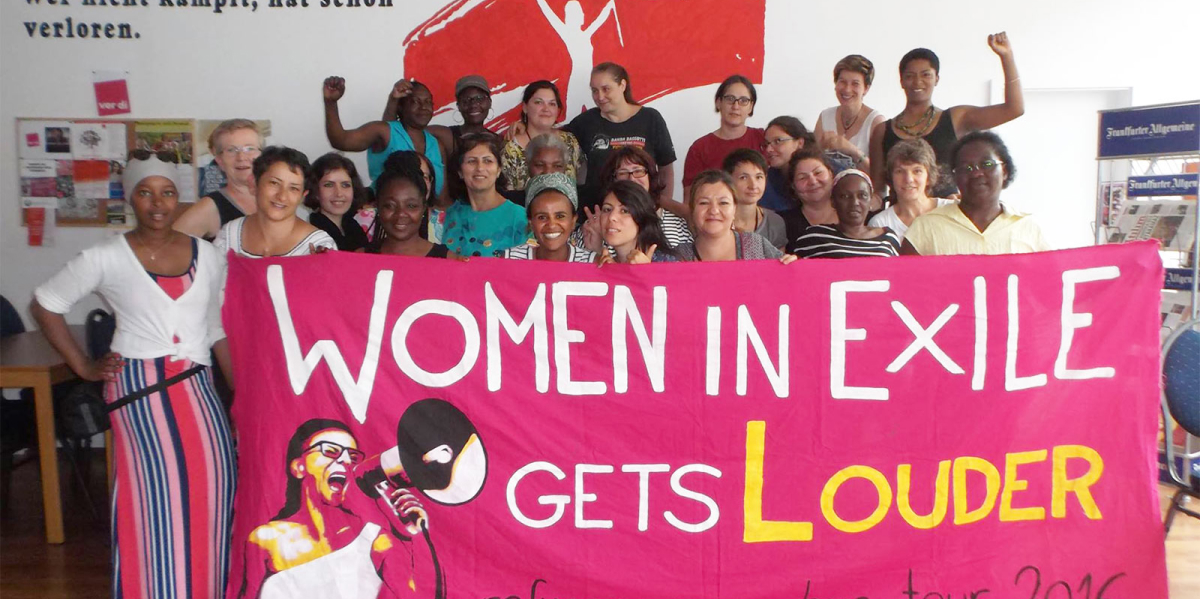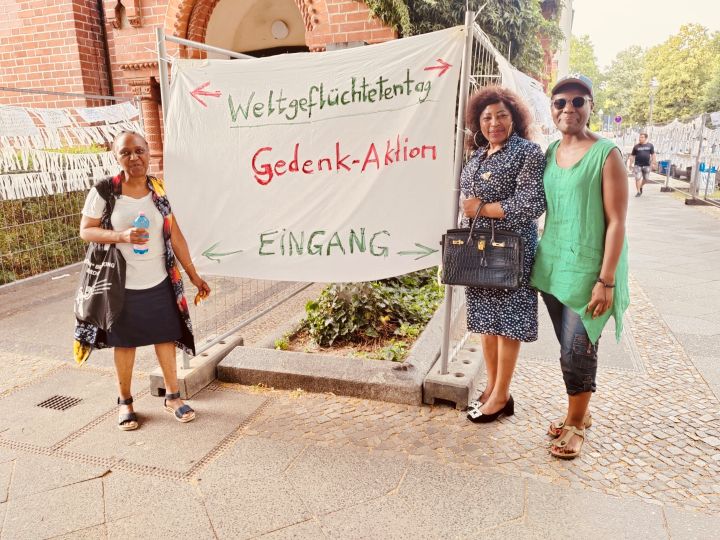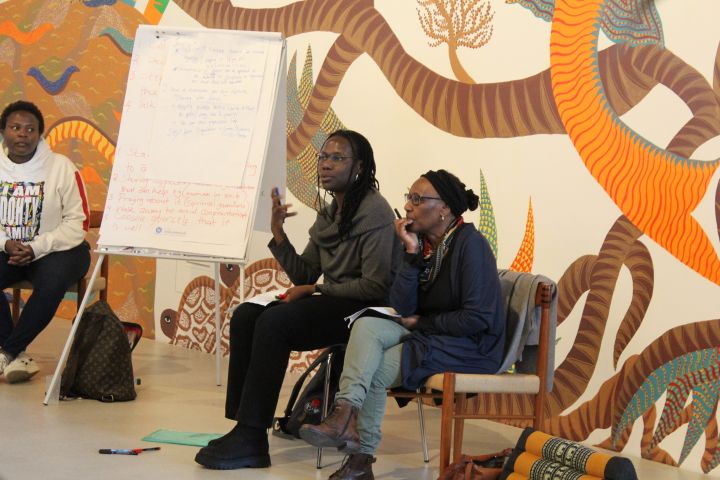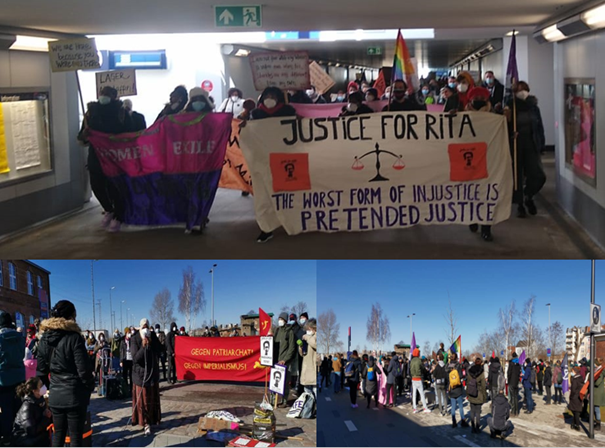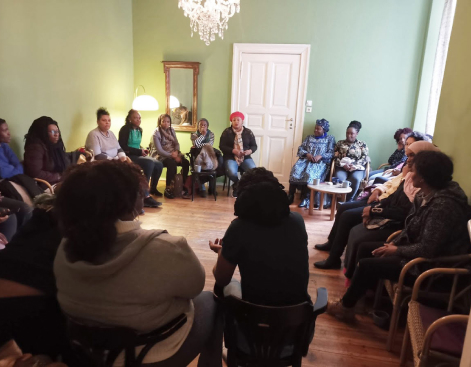Excerpt from pages 163–166 of our book “Breaking Borders to Build Bridges“ available through Edition Assemblage
I’ve never really defined myself as a “Friend”, partly because I joined Women in Exile before the Friends as a support structure came about. I simply consider myself a companion who joins in in particular situations, on particular topics. My first contact with Women in Exile was in the autumn of 2008. That’s when I began working in the office of the Brandenburg Refugee Council, where I took on the management. I was mostly in touch with Bethi. Women in Exile were not yet an association at that time and therefore had no opportunity to apply for funding for their activities, so the applications for workshops or meetings went through the Refugee Council. I myself only had dealings with Bethi, who looked after the bills and invoices. Our first encounter wasn’t quite so fortunate (laughs) because Bethi brought me a shoebox full of receipts. I was totally annoyed and wanted the receipts pasted on paper and pre-sorted, and Bethi was annoyed by my demand because that’s the way it had been done up till then. Fortunately, this unspoken conflict was quickly resolved. (laughs)
At the time, Women in Exile were a purely voluntary initiative and the women* who were active were dedicated and tireless. I’m thinking primarily of Bethi and Florence. The other women*, some of whom are still involved today, were often only there sporadically. That’s why I felt it was nothing short of a sea change when the association was finally established after a very long process. Being able to get grants and funds and receive donations made so many things possible: to rent an office, set up paid positions, etc. It was a big step forward for the organization because there were now full-time employees who could put many hours a week into campaign work and preparing meetings. Women in Exile became more visible, with a higher public profile. So much more was possible because the time and financial resources were available.
Another big leap in its development, alongside the founding of the association in 2011, was before that – I think in 2010 – when the meetings began that later led to the emergence of Women in Exile & Friends. I was very sceptical at first because I thought: yeah, yeah, the Berlin women* are coming again to show the refugee women* how things have to be done. I then took part in a meeting at the home in Luckenwalde and cooked for everyone. And then I sat down with them. I found the open and respectful way of dealing with one other extremely pleasant. There was a lot of positive energy and a desire to work together at that time. When Women in Exile & Friends first came about, there were very different individual ideas and wishes for this new link-up. But there was an awareness on both sides that great care had to be taken to ensure that Women in Exile have the ultimate decision-making prerogative. The positions in the office in Potsdam should be filled at least equally with refugee women* and Friends, as should the committees in which decisions were made.
F.: Nevertheless, there were glaring hierarchies of knowledge, as well as dominance and problematic dynamics in the history of Women in Exile.
A: By all means. And that was always one of the reasons I didn’t consider myself a Friend and didn’t want to be one either. I had the feeling that I simply knew too much about the law on associations and subsidies – about all these financial things. This knowledge per se creates a position of power. In addition, I have a dominant streak, which I’m aware of, and an urge to shape things and press ahead with them. So it was clear to me that I didn’t want to be part of Women in Exile & Friends. I simply want to accompany the whole thing selectively and pass on my knowledge wherever wanted and needed.
Since I’m not formally involved, I can’t say anything about specific dominant behaviour or situations where an advantage in knowledge was specifically linked to power aspirations. But my perception is that problematic dynamics and conflicts in organizations that go from being a political initiative to an association often take a similar course – that’s my experience, at least, from many years of working in different organizations. The development towards an association did not have only positive aspects. All of a sudden there were full-timers and volunteers. That’s always a source of tension. The full-time employees can make their livelihood entirely or at least partially through their political work, i.e. combine their political work with securing their livelihood. That’s a great privilege, but due to the scarce resources only a few positions can be set up. This produces dissatisfaction and covetousness. Which women* are given the small number of jobs? What kind of knowledge do we need within the team to be able to do the work at hand, especially all the bureaucratic things we now have to deal with?
I see another source of tension between those who’ve been involved from the beginning or for a long time – who were there when Women in Exile was a cash-strapped political initiative – and those who joined when it had access to project resources and donations. Due to the extremely precarious situation of refugee women*, I felt the conflicts in Women in Exile between employees and volunteers, for example over money, to be much sharper and more heated than in other organizations where employees and volunteers work together. But of course it also has to do with the structure of Women in Exile: the organization is open to all refugee women*, and those who come to Women in Exile and become active do so for a wide variety of reasons.
F.: Women* usually come out of sheer necessity, and yes, that influences the cooperation and the dynamics.
A.: I noticed that, too, in the phases when I had more to do with the structure. Openness to everyone means that some women* come just to get support when they need it but have no interest in organizing together beyond that. Others, due to their situation, simply don’t have the energy to be involved more and in the long term. As for the conflicts, so far they’ve always been resolved, no matter how strenuous they were for everyone. Some of them flare up again and again. I don’t know Women in Exile without problems (laughs). But I know that from other organizations too – I think it’s just part of there being arguments, different interests and friction. That’s part of it. I’ve also noticed that many women* are still on board. That’s a good sign, I think. And I find it admirable when I see how long many of the women* have been around.
Incidentally, I can think of another, third leap in development. I wasn’t able to really follow it because of the pandemic, but the opening of the space in Hermannstrasse is also an important step. Having one’s own premises creates opportunities to meet and work together – opportunities that didn’t exist like that in the past. It used to be much more time-consuming and difficult.
F.: Can you say something again about the role of the Friends?
A.: Women in Exile & Friends is devised so that the Friends provide support and thus help shape ongoing activities but are always prepared to rally behind the refugee women*, especially when there are differences of opinion. That, at least, is the agreement as I know it. As a Friend, you can have real input or propose methods, but if it doesn’t resonate with Women in Exile you can’t impose it. Then you have to decide for yourself as a Friend: “Do I share that, are there political differences, or are there simply different prioritizations? Can I keep working with Women in Exile and doing what I’ve done so far, or do I no longer feel comfortable?” And then perhaps we’ll part company again. Just like refugee women* leave Women in Exile when they realize there isn’t enough overlap for them. Still, I don’t think it’s a coincidence that proportionately more Friends have left than Women in Exile. To me, the Friends have been very important because Women in Exile wouldn’t be where it is today if it hadn’t been for the support and commitment of the Friends over the years. But it seems to me, after so many years of experience and so many years of organizing together, that the role of the Friends has become less significant and more blurred. I really hope the Friends become superfluous one day. I think that would be really great. It would be a whole new position of strength.
